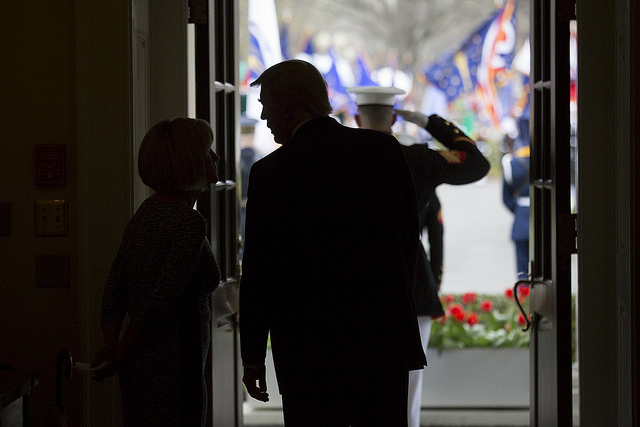Loyalty and Principle in the Trump White House
We don’t yet know why Mark Corallo, the spokesman for President Trump’s personal legal team, resigned yesterday. Politico, citing anonymous sources, provides a host of possible reasons:

Published by The Lawfare Institute
in Cooperation With

We don’t yet know why Mark Corallo, the spokesman for President Trump’s personal legal team, resigned yesterday. Politico, citing anonymous sources, provides a host of possible reasons:
- He had “grown frustrated with the operation [of the Trump legal team] and the warring factions and lawyers.
- He “was concerned about whether he was being told the truth about various matters.
- “He didn't like the strategy to attack [Mueller’s] credibility.”
- He “no longer needed the money.”
That runs the gamut. And it raises the related question about the proper criteria for resignation when one works in senior governmental positions for a President who displays disdain for truth-telling, the rule of law, norms of investigatory independence, and respect for the decisions of the senior Justice Department officials he appointed.
I’ve written on this before, here and here. Resignation is an intensely personal decision. The mix of factors include one’s commitments to public service and principle, and concern for one’s reputation before various audiences. The “degrees of geographical and personal independence the official has from the president” also matter, since the closer one is to the President on these dimensions, the more one is dirtying one’s hands in propping up his apparent efforts to destroy American institutions. It also matters whether one’s resignation will do more harm than good, and whether one can tell oneself (and others, especially later) a plausible story about why continued service for such President constituted important service to the American people.
I had these criteria in mind when I argued yesterday against the resignations of Attorney General Sessions and Deputy Attorney General Rosenstein in response to Trump’s attacks on them. Yes, they would be justified in resigning. But their resignation at this moment would deepen rather than alleviate concerns about investigatory independence. They are not propping up the President. These men have thus far—at least in Sessions’ recusal and Rosenstein’s appointment of Robert Mueller—served Justice Department independence and integrity at a time when those things are under attack by the President. (Rosenstein’s enabling role in Trump’s firing of Comey over the Russia investigation is of course another matter.)
I continue to believe, however, that such arguments are harder to make for “senior political and legal appointees in the White House.” As I argued a few months ago:
These officials seem to be in the worst position of all. Their primary mission is to serve the nation by serving the president directly. Yes, Chief of Staff Reince Priebus can tell himself that he is helping the Republican Party and the American people by helping the President. And White House Counsel Don McGahn and his team can tell themselves that they are serving the nation—for example, in their important work selecting judges and enforcing ethics rules—beyond just helping the President. But much of the work of these officials amounts to little more than enabling and protecting the President, personally and politically. That becomes a problem when the enabling and protecting comes in the service of mendacity or in a way inextricable from mendacity.
A good deal of the daily work by these officials in the White House, in other words, is a lower-key version of the work of Sean Spicer, who compromises himself daily in order to prop up the president’s lies and destructive actions. I imagine that these officials have the hardest time telling themselves (and others) a story about why their services are needed to minimize the damage Trump is causing, for these are the officials whose jobs are largely devoted to empowering the President. (I imagine it is especially hard for the young, super-accomplished line attorneys in the White House Counsel’s office to work in support of a truth-defying President who incessantly trashes courts and the legal system in ways that Neil Gorsuch finds "disheartening” and “demoralizing.”) These are the jobs that are hardest to serve in if one disrespects the President. These jobs will likely grow harder and harder if the Trump presidency continues to accomplish so little, especially if the FBI investigations begin to absorb White House political and legal attention. And these are the jobs about which it will be harder to explain later why one continued in the job after it was clear that the President one worked so hard to support was so unworthy of his office.
These thoughts have new salience in light of the stories this morning in the New York Times and Washington Post that “lawyers and aides” are gathering information to discredit Special Counsel Robert Mueller. Neither story makes clear whether these lawyers and aides are part of the President’s governmental staff or his personal legal defense team. If these are White House lawyers and aides, however, then they are government officials directly helping the President in his efforts to sow distrust in the integrity of the Justice Department and in law enforcement more generally. To me that seems like a choice of loyalty and political expediency over principle and service to the American people.
If White House staff are indeed involved in these discrediting efforts, they may well see things differently than I and others do from the outside. They probably see the President’s situation more sympathetically, and their service as more vital to the legitimate aims of the presidency. They may be right. But they may not be as well.





